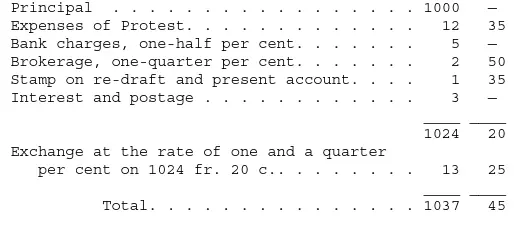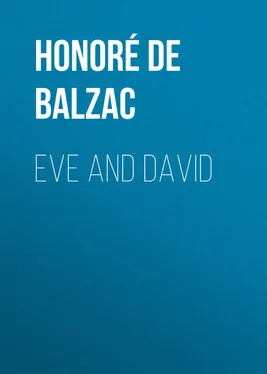Honoré Balzac - Eve and David
Здесь есть возможность читать онлайн «Honoré Balzac - Eve and David» — ознакомительный отрывок электронной книги совершенно бесплатно, а после прочтения отрывка купить полную версию. В некоторых случаях можно слушать аудио, скачать через торрент в формате fb2 и присутствует краткое содержание. Жанр: literature_19, foreign_antique, foreign_prose, на английском языке. Описание произведения, (предисловие) а так же отзывы посетителей доступны на портале библиотеки ЛибКат.
- Название:Eve and David
- Автор:
- Жанр:
- Год:неизвестен
- ISBN:нет данных
- Рейтинг книги:3 / 5. Голосов: 1
-
Избранное:Добавить в избранное
- Отзывы:
-
Ваша оценка:
- 60
- 1
- 2
- 3
- 4
- 5
Eve and David: краткое содержание, описание и аннотация
Предлагаем к чтению аннотацию, описание, краткое содержание или предисловие (зависит от того, что написал сам автор книги «Eve and David»). Если вы не нашли необходимую информацию о книге — напишите в комментариях, мы постараемся отыскать её.
Eve and David — читать онлайн ознакомительный отрывок
Ниже представлен текст книги, разбитый по страницам. Система сохранения места последней прочитанной страницы, позволяет с удобством читать онлайн бесплатно книгу «Eve and David», без необходимости каждый раз заново искать на чём Вы остановились. Поставьте закладку, и сможете в любой момент перейти на страницу, на которой закончили чтение.
Интервал:
Закладка:

One thousand and thirty-seven francs forty-five centimes, for which we repay ourselves by our draft at sight upon M. Metivier, Rue Serpente, Paris, payable to order of M. Gannerac of L’Houmeau.
ANGOULEME, May 2, 1822 COINTET BROTHERS.At the foot of this little memorandum, drafted with the ease that comes of long practice (for the writer chatted with Doublon as he wrote), there appeared the subjoined form of declaration: —
“We, the undersigned, Postel of L’Houmeau, pharmaceutical chemist, and Gannerac, forwarding agent, merchant of this town, hereby certify that the present rate of exchange on Paris is one and a quarter per cent.
“ANGOULEME, May 2, 1822.”“Here, Doublon, be so good as to step round and ask Postel and Gannerac to put their names to this declaration, and bring it back with you to-morrow morning.”
And Doublon, quite accustomed as he was to these instruments of torture, forthwith went, as if it were the simplest thing in the world. Evidently the protest might have been sent in an envelope, as in Paris, and even so all Angouleme was sure to hear of the poor Sechards’ unlucky predicament. How they all blamed his want of business energy! His excessive fondness for his wife had been the ruin of him, according to some; others maintained that it was his affection for his brother-in-law; and what shocking conclusions did they not draw from these premises! A man ought never to embrace the interests of his kith and kin. Old Sechard’s hard-hearted conduct met with approval, and people admired him for his treatment of his son!
And now, all you who for any reason whatsoever should forget to “honor your engagements,” look well into the methods of the banking business, by which one thousand francs may be made to pay interest at the rate of twenty-eight francs in ten minutes, without breaking the law of the land.
The thousand francs, the one incontestable item in the account, comes first.
The second item is shared between the bailiff and the Inland Revenue Department. The six francs due to the State for providing a piece of stamped paper, and putting the debtor’s mortification on record, will probably ensure a long life to this abuse; and as you already know, one franc fifty centimes from this item found its way into the banker’s pockets in the shape of Doublon’s rebate.
“Bank charges one-half per cent,” runs the third item, which appears upon the ingenious plea that if a banker has not received payment, he has for all practical purposes discounted a bill. And although the contrary may be the case, if you fail to receive a thousand francs, it seems to be very much the same thing as if you had paid them away. Everybody who has discounted a bill knows that he has to pay more than the six per cent fixed by law; for a small percentage appears under the humble title of “charges,” representing a premium on the financial genius and skill with which the capitalist puts his money out to interest. The more money he makes out of you, the more he asks. Wherefore it would be undoubtedly cheaper to discount a bill with a fool, if fools there be in the profession of bill-discounting.
The law requires the banker to obtain a stock-broker’s certificate for the rate of exchange. When a place is so unlucky as to boast no stock exchange, two merchants act instead. This is the significance of the item “brokerage”; it is a fixed charge of a quarter per cent on the amount of the protested bill. The custom is to consider the amount as paid to the merchants who act for the stock-broker, and the banker quietly puts the money into his cash-box. So much for the third item in this delightful account.
The fourth includes the cost of the piece of stamped paper on which the account itself appears, as well as the cost of the stamp for re-draft, as it is ingeniously named, viz., the banker’s draft upon his colleague in Paris.
The fifth is a charge for postage and the legal interest due upon the amount for the time that it may happen to be absent from the banker’s strong box.
The final item, the exchange, is the object for which the bank exists, which is to say, for the transmission of sums of money from one place to another.
Now, sift this account thoroughly, and what do you find? The method of calculation closely resembles Polichinelle’s arithmetic in Lablache’s Neapolitan song, “fifteen and five make twenty-two.” The signatures of Messieurs Postel and Gannerac were obviously given to oblige in the way of business; the Cointets would act at need for Gannerac as Gannerac acted for the Cointets. It was a practical application of the well-known proverb, “Reach me the rhubarb and I will pass you the senna.” Cointet Brothers, moreover, kept a standing account with Metivier; there was no need of a re-draft, and no re-draft was made. A returned bill between the two firms simply meant a debit or credit entry and another line in a ledger.
This highly-colored account, therefore, is reduced to the one thousand francs, with an additional thirteen francs for expenses of protest, and half per cent for a month’s delay, one thousand and eighteen francs it may be in all.
Suppose that in a large banking-house a bill for a thousand francs is daily protested on an average, then the banker receives twenty-eight francs a day by the grace of God and the constitution of the banking system, that all powerful invention due to the Jewish intellect of the Middle Ages, which after six centuries still controls monarchs and peoples. In other words, a thousand francs would bring such a house twenty-eight francs per day, or ten thousand two hundred and twenty francs per annum. Triple the average of protests, and consequently of expenses, and you shall derive an income of thirty thousand francs per annum, interest upon purely fictitious capital. For which reason, nothing is more lovingly cultivated than these little “accounts of expenses.”
If David Sechard had come to pay his bill on the 3rd of May, that is, the day after it was protested, MM. Cointet Brothers would have met him at once with, “We have returned your bill to M. Metivier,” although, as a matter of fact, the document would have been lying upon the desk. A banker has a right to make out the account of expenses on the evening of the day when the bill is protested, and he uses the right to “sweat the silver crowns,” in the country banker’s phrase.
The Kellers, with correspondents all over the world, make twenty thousand francs per annum by charges for postage alone; accounts of expenses of protest pay for Mme. la Baronne de Nucingen’s dresses, opera box, and carriage. The charge for postage is a more shocking swindle, because a house will settle ten matters of business in as many lines of a single letter. And of the tithe wrung from misfortune, the Government, strange to say! takes its share, and the national revenue is swelled by a tax on commercial failure. And the Bank? from the august height of a counting-house she flings an observation, full of commonsense, at the debtor, “How is it?” asks she, “that you cannot meet your bill?” and, unluckily, there is no reply to the question. Wherefore, the “account of expenses” is an account bristling with dreadful fictions, fit to cause any debtor, who henceforth shall reflect upon this instructive page, a salutary shudder.
On the 4th of May, Metivier received the account from Cointet Brothers, with instructions to proceed against M. Lucien Chardon, otherwise de Rubempre, with the utmost rigor of the law.
Eve also wrote to M. Metivier, and a few days later received an answer which reassured her completely: —
“I have duly received your esteemed favor of the 5th instant. From your explanation of the bill due on April 30th, I understand that you have obliged your brother-in-law, M. de Rubempre, who is spending so much that it will be doing you a service to summons him. His present position is such that he is likely to delay payment for long. If your brother-in-law should refuse payment, I shall rely upon the credit of your old-established house. – I sign myself now, as ever, your obedient servant,
Читать дальшеИнтервал:
Закладка:
Похожие книги на «Eve and David»
Представляем Вашему вниманию похожие книги на «Eve and David» списком для выбора. Мы отобрали схожую по названию и смыслу литературу в надежде предоставить читателям больше вариантов отыскать новые, интересные, ещё непрочитанные произведения.
Обсуждение, отзывы о книге «Eve and David» и просто собственные мнения читателей. Оставьте ваши комментарии, напишите, что Вы думаете о произведении, его смысле или главных героях. Укажите что конкретно понравилось, а что нет, и почему Вы так считаете.












